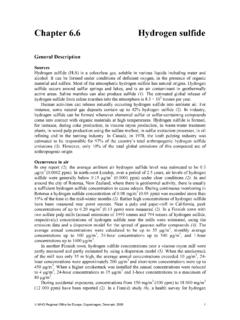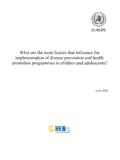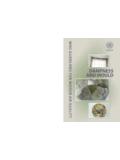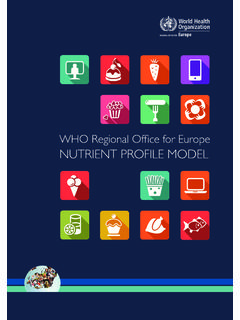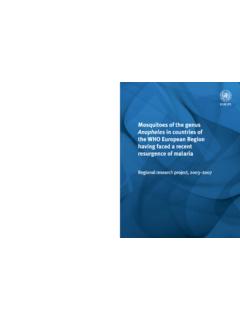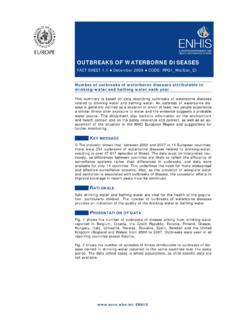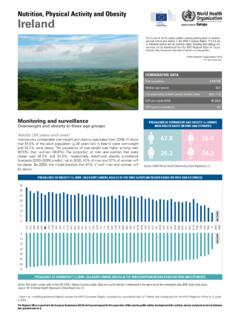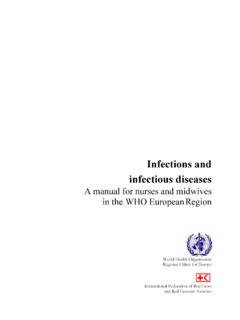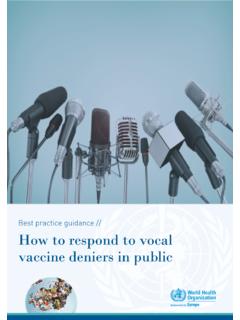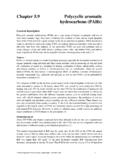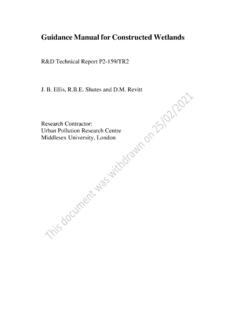Transcription of Waste and human health: Evidence and needs Meeting …
1 Waste and human health : Evidence and needs WHO Meeting Report 5 6 November 2015 Bonn, Germany Abstract Management of Waste is a demanding and challenging undertaking in all European countries, with important implications for human health and well-being, environmental preservation, sustainability and economy. Comprehensive legal frameworks, mainly developed on the basis of environmental criteria, exist that regulate Waste management. Compliance with these regulations has resulted in significant progress; however concerns remain as to the possible health impacts of Waste circulation, management and disposal, especially in connection with informal practices and obsolete technologies.
2 The available scientific Evidence on the Waste -related health effects is not conclusive, but suggests the possible occurrence of serious adverse effects, including mortality, cancer, reproductive health , and milder effects affecting well-being. This Evidence , combined with the growing importance of sustainability considerations, should allow Member States of the WHO Regional Office for Europe to formulate health -friendly policy orientations. Keywords Waste MANAGEMENT - methods HAZARDOUS Waste - adverse effects ENVIRONMENTAL health health EUROPE Address requests about publications of the WHO Regional Office for Europe to: Publications WHO Regional Office for Europe UN City, Marmorvej 51 DK-2100 Copenhagen , Denmark Alternatively, complete an online request form for documentation, health information, or for permission to quote or translate, on the Regional Office web site ( ).
3 World health Organization 2016 All rights reserved. The Regional Office for Europe of the World health Organization welcomes requests for permission to reproduce or translate its publications, in part or in full. The designations employed and the presentation of the material in this publication do not imply the expression of any opinion whatsoever on the part of the World health Organization concerning the legal status of any country, territory, city or area or of its authorities, or concerning the delimitation of its frontiers or boundaries. Dotted lines on maps represent approximate border lines for which there may not yet be full agreement.
4 The mention of specific companies or of certain manufacturers products does not imply that they are endorsed or recommended by the World health Organization in preference to others of a similar nature that are not mentioned. Errors and omissions excepted, the names of proprietary products are distinguished by initial capital letters. All reasonable precautions have been taken by the World health Organization to verify the information contained in this publication. However, the published material is being distributed without warranty of any kind, either express or implied.
5 The responsibility for the interpretation and use of the material lies with the reader. In no event shall the World health Organization be liable for damages arising from its use. The views expressed by authors, editors, or expert groups do not necessarily represent the decisions or the stated policy of the World health Organization. CONTENTS Acknowledgements .. 2 Abbreviations .. 3 Introduction .. 4 Waste management in Europe: the framework for the production and management .. 5 EU legislation on Waste .. 5 The Basel Convention and Waste movements.
6 6 Separate collection .. 7 Green growth .. 8 Circular economy .. 8 The informal sector .. 9 Production of Waste .. 9 Waste management .. 11 health effects of Waste management .. 14 Population exposed to pollution from Waste management .. 14 Municipal solid Waste landfills .. 15 Exposure assessment .. 15 health effects .. 15 Municipal solid Waste incinerators .. 16 Exposure assessment .. 16 health effects .. 17 Towards a European assessment of the health impact of landfilling .. 18 Hazardous and toxic Waste .. 19 Emerging priorities: E- Waste .. 20 Discussion points.
7 20 Knowledge gaps .. 21 References .. 23 Annex 1 .. 28 Guidance documents and other support actions for implementation of EU Waste legislation .. 28 Waste Framework Directive (WFD) .. 28 Mining Waste .. 28 WEEE/RoHS .. 28 ELV Directive .. 29 The Waste Shipment Regulation .. 29 BREFs on best available techniques .. 29 More information on EU Waste policy and legislation .. 29 Annex 2: Meeting programme .. 30 Annex 3: List of participants .. 32 2 Acknowledgements This report reflects the discussion and conclusions of the WHO Meeting Waste and human health : Evidence and needs , held in Bonn, Germany, on 5-6 November 2015.
8 Programme and participants in the Meeting are reported in the Annexes. WHO is most grateful to all participating experts who shared their knowledge, experiences and views. The report was compiled by the Meeting rapporteur Andrea Ranzi, Regional Environmental Protection Agency of Emilia-Romagna, Italy, on the basis of oral and written contributions from participants. Maria Dunbar, University of Copenhagen, provided invaluable support to the drafting and finalization. The Meeting was chaired by Pietro Comba, National health Institute of Italy.
9 The Meeting was financially supported by the German Federal Ministry for the Environment, Nature Conservation, Building and Nuclear Safety, whose contribution is gratefully acknowledged. 3 Abbreviations AC attributable cases AFexp attributable fraction in exposed people BAT best available technique DALYs disability adjusted life years DW disability weight EC European Commission EEA European Environment Agency EHP European Environment and health Process EPR extended producer responsibility EU European Union EU-15 EU member countries until 30 April 2004 EU-27 EU member countries from 1 January 2007 until 30 June 2013 EU-28 EU member countries since 1 July 2013 HIA health impact assessment H2S hydrogen sulphide ICI institutional.
10 Commercial and industrial L disease duration MBT mechanical biological treatment NGO nongovernmental organization NIMBY not in my backyard PAH polycyclic aromatic hydrocarbons PCB polychlorinated biphenyl PCDD polychlorinated dibenzo-p-dioxins PCDF polychlorinated dibenzofurans PCT polychlorinated terphenyl PIC prior informed consent POP persistent organic pollutant PPP polluter pays principle RR relative risk SDG Sustainable Development Goal WEEE Waste electrical and electronic equipment 4 Introduction Management of Waste is a demanding and challenging undertaking in all European countries, with important implications for human health and well-being, environmental preservation, sustainability and economy.
